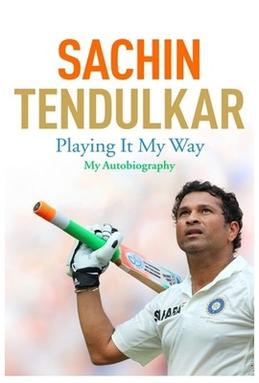
"Playingitmywaybookcover" by Source (WP:NFCC#4). Licensed under Fair use via Wikipedia.
.
 . . . . . . . . Flipkart Amazon Videos Promo Wiki
Playing It My Way is the autobiography of former Indian cricketer Sachin Tendulkar. It was launched on 5 November 2014 in Mumbai. The book summarises Tendulkar's early days, his 24 years of international career and aspects of his life that have not been shared publicly. "I knew that if I agreed to write my story, I would have to be completely honest, as thats the way I have always played the game and that would mean talking about a number of things I have not addressed in public before. So here I am, at the end of my final innings, having taken that last walk back to the pavilion, ready to recount as many incidents as I can remember since first picking up a cricket bat as a child in Mumbai thirty-five years ago." - Sachin Tendulkar, Source: wikipedia
There’s a restless feeling knocking on my door today on the eve of my book launch need all your love and support #PlayingItMyWayLaunch
New record in India by Sachin Tendulkar's “Playing It My Way”: Sachin Ramesh Tendulkar is a former Indian cricketer widely acknowledged as one of the greatest batsmen of all time, popularly holding the title "God of Cricket". Sachin even after retirement, continues to break records and set new benchmarks. Latest achievement came off the field as his autobiography “Playing It My Way” accumulated the highest pre-orders in the fiction and non-fiction category in India. Tendulkar's biography 'Playing it My Way' has already beaten Steve Jobs' biography (by Walter Isaacson) as the best-selling book in this category in India. The record has

been broken in less than a day of the Hachette India-published book being launched in Mumbai. Sachin's autobiography is even challenging records set by authors like Dan Brown and JK Rowling of the Harry Potter fame, who mainly write fiction. Tendulkar's book 'Playing it My Way', which contains some startling revelations made by the icon former India cricketer, has a cover price of Rs 899. However, the book is available for half that price online. Source: Article. Sachin Tendulkar unveils autobiography Playing It My Way in star-studded ceremony : Sachin Tendulkar's much-awaited autobiography Playing It My Way was launched on Wednesday in the presence of some of his former teammates, celebrities and family
members at a ceremony in Mumbai. The book, the first copy of which he gave to his mother Rajni earlier in the day, was unveiled by Tendulkar himself amid thundering applause by the gathering. At the launch, Tendulkar presented a copy to his mentor and childhood coach Ramakant Achrekar in the presence of his daughter Sara. "I would like to present the first copy after launch to somebody very special in my life, Tendulkar said before handing over a copy of the book to a wheelchair-bound Achrekar. Before the launch of the book, cricket analyst and host for the evening Harsha Bhogle had three panel discussion sessions with Tendulkar's former teammates and family, who significantly feature in the book. The first panel discussion
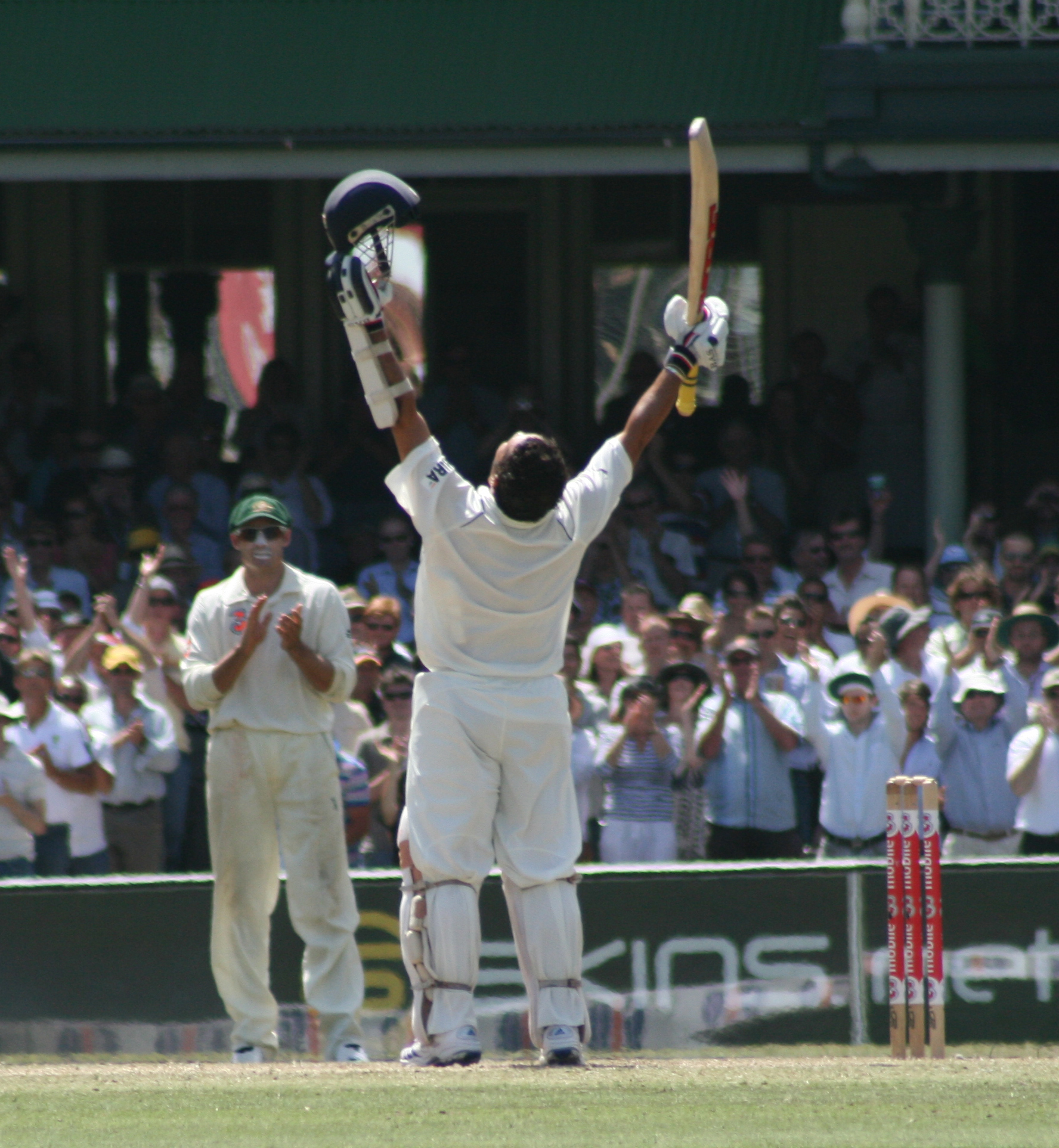
"Tendulkar closup" by Privatemusings - Own work. Licensed under CC BY 3.0 via Commons
was attended by former India captains Sunil Gavaskar, Dilip Vengsarkar, Ravi Shastri and former Mumbai cricketer Vasu Paranjape, who played a crucial role in shaping Tendulkar's career. Gavaskar remembered how he met Tendulkar for the first time and was impressed by his talent at the first look. "Hemant Waingankar and Anil Joshi introduced me to Sachin and asked me to see him bat. Probably, I have finished my cricket at that stage. He was batting at the Wankhede nets against Raju Kulkarni, who was a very slippery customer. In the nets, you don't really think about no balls and Raju was doing the same. But the manner in which Sachin was punching the ball off the backfoot towards mid-off and mid-on... that impressed me," Gavaskar recollected. Asked what if he would got the chance to bat alongside Tendulkar, Gavaskar said: "I think as far as running between the wickets, we would have been very good." Former Mumbai and Indian skipper Vengsarkar said he handpicked Tendulkar to play for the team after watching him easily negotiating India's best fast bowler at the time, Kapil Dev, in the Wankhede Stadium nets, where the Indian team had come to play against the touring New Zealand team. "I was the captain (of Mumbai) that time and I heard a lot about him. Vasu (Paranjape) brought him and introduced him to me. Vasu said you should go and watch Sachin play. I said not now but Vasu said no, no, you should go," Vengsarkar said. "I was playing my 100th Test and we were practicing at the CCI. I asked Kapil, Maninder to bowl at him and at such a tender age he played them with ease. Then I told (Mumbai) selectors we should pick him at least in the 15 but in the next three days he didn't come for practice. I was a bit livid with him. I told Vasu to ask him the reason and he said I had an exam." Shastri, who watched Tendulkar from close quarters during the master batsman's classic 148 not out at Sydney in 1992, said according to him that innings was the best of his career. "In the tour of Pakistan in 1989, Sachin made his debut but got out early. I was lying down in the dressing room and was livid with my dismissal. He took his time and walked up to me after an hour. By the time I calmed down and he said to me 'I was in a hurry'. "(During that innings) the time he was at the crease he looked like a fish out of water, but a month later he looked like a big shark in the water and continued to be so for the next 25 years," he said. Talking about Tendulkar's epic 148 not out in Sydney Cricket Groud, his first and one of the best on Australian soil, Shastri, who was batting  alongside the master blaster said: "I was just 22 yards away and it was the best place to witness such a wonderful innings. Tendulkar's Sydney innings was stroke-play of the highest order." Source: Hindustan Times. Nitheesh kumar M: The greatest run-scorer in the history of cricket, Sachin Tendulkar retired in 2013 after an astonishing 24 years at the top. The most celebrated Indian cricketer of all time, he received the Bharat Ratna Award - India's highest civilian honour - on the day of his retirement. Now Sachin Tendulkar tells his own remarkable story - from his first Test cap at the age of 16 to his 100th international century and the emotional final farewell that brought his country to a standstill. When a boisterous Mumbai youngster's excess energies were channelled into cricket, the result was record-breaking schoolboy batting exploits that launched the career of a cricketing phenomenon. Before long Sachin Tendulkar was the cornerstone of India's batting line-up, his every move watched by a cricket-mad nation's devoted followers. Never has a cricketer been burdened with so many 
#SachinTendulkar Autobiography: India Publishers Vie for Language Rights
expectations; never has a cricketer performed at such a high level for so long and with such style - scoring more runs and making more centuries than any other player, in both Tests and one-day games. And perhaps only one cricketer could have brought together a shocked nation by defiantly scoring a Test century shortly after terrorist attacks rocked Mumbai. His many achievements with India include winning the World Cup and topping the world Test rankings. Yet he has also known his fair share of frustration and failure - from injuries and early World Cup exits to stinging criticism from the press, especially during his unhappy tenure as captain. Despite his celebrity status, Sachin Tendulkar has always remained a very private man, devoted to his family and his country. Now, for the first time, he provides a fascinating insight into his personal life and gives a frank and revealing account of a sporting life like no other. Source: Article, When Anjali fell for 17-year-old Sachin Tendulkar: It was at an airport where medical student Anjali Mehta saw the wonder boy of Indian cricket and was floored by the "cute looks" of Sachin Tendukar. She ran after him, screaming Sachin, Sachin, much to the embarrassment of the 17-year-old Tendulkar. She even forgot about her mother whom she had to gone to pick with a friend. This story of love-at-first-sight was revealed by Anjali Tendulkar, wife of one of the greatest batsmen in world cricket, at the launch of his autobiography - Playing It My Way. "I had gone to pick my mother and then I saw him and my friend told me he is the wonder boy of Indian cricket. I told my friend, Oh! he is so cute. Then I ran after him and I forgot about my mother," Anjali said, recollecting the moments. "Sachin was so embarrassed and did not even look at me." Anjali said she managed to get the number of Tendulkar after that, called him and was lucky that he
picked her call. "I called him and said I am Anjali and I saw you at the airport. He said he remembered me. When asked what colour I was wearing, he remembered that it was an orange colour T-shirt." Anjali, now a mother of two, said she was destined to meet him, since on two previous occasions she could have met Tendulkar but could not do so as she was not interested in the game of cricket. "He was there with Star Cricket Club and I was also there in England. My dad called me when the Indian team was playing. He wanted me to meet the boy who had scored a century but I said I don't want to meet this boy, I am not interested in cricket. "Maybe if I had met, I would have chased him when he was 15," she said as the gathering listened to the love story with attention and amusement. Anjali also revealed that Sachin was scared when she visited his house for the first time, posing as a journalist. "He was a bit hesitant and said 'how can a girl can come to my house'." Adding to the story, Tendulkar said his sister-in-law guessed that something was fishy in the whole episode. "She asked me if she was really a journalist or something else," Tendulkar said, adding that she had seen him giving Anjali chocolates. Anjali also said it was difficult to be in touch with Tendulkar when he was on cricketers tours as there was no e-mail, sms and the call rates were very expensive. And whenever she made calls, she would do so after 10pm, walking out of the campus, a stretch of which was always full of 'goondas' in the night, since the call rates were low only at that time. "Writing letters was the best option in those days," she said. Anjali also revealed that it was she who informed Sachin's parents that they wanted to get engaged since he was away in New Zealand. Tendulkar added that telling his parents that he wanted to marry Anjali was tougher than facing

I am Not God of Cricket, Just Blessed to Have Love of Fans: #SachinTendulkar
the most fearsome fast bowlers. "Indeed it was and that is how I had planned it. I was sitting in New Zealand happily and Anjali did it," he said. Anjali said it was tough to be the wife of a cricket star. "People think it is very glamorous, but it's tough. Whenever your husband gets out early, India loses, you feel personally that you have done something wrong. "And travelling with kids was never easy," she said. Source: Article, Master Blaster speaks his heart out: Sachin Tendulkar continues to inspire awe in India even after a year into his retirement from cricket. It’s impossible to conceive a bigger sports star in the country. The icon spoke to select reporters on the day of the launch of his autobiography. Q) Motivation behind the book ? I just wanted to share my life with everyone. It is impossible to share each and everything that has happened in my life but what matters is making sincere efforts in sharing my thoughts. So I just wanted to play it my way. Q) Toughest part of writing the book ? It was the relationship between Anjali and me. I have always kept that close to my heart and very few guys know about it including my family and her family. Q) Controversies in the book? All I have said is the truth. The book has"Master Blaster at work" by Vikas - The Legend. Licensed under CC BY 2.0 via Commons.  everything. There are some funny incidents. There are also so called controversial things. Q) Why did you never take a stand on major issues? I have taken a stand on issues about which I was 100 per cent sure. I never spoke about things about which I didn’t have first-hand information. I didn’t want to make loose statements. Q) Are you disappointed with how things turned out under Greg Chappell? I remember precisely the first two tours I missed and there was controversy in Sri Lanka and in Zimbabwe. I wasn’t there on both those tours. Driving back from Mohali after playing the Challenger Trophy, Zaheer Khan, Ajit Agarkar, possibly Harbhajan Singh and a couple of guys told me that they weren’t comfortable under Greg. I clearly told them he has joined us and we should be accommodate him and give him a chance. I said we should let him settle down, for any coach takes time to settle down. Later I realised the players were right. Q) Why do you think Greg behaved the way he did? I don’t know. I wish I could understand what he was trying to do. Q) Didn’t you tell Dravid that Chappell wanted you to take over captaincy from him? No. As far as I was concerned the matter was over right there because I didn’t accept captaincy. Q) How tough was it writing about your team mates? I don’t think there should be any problem because I am not hurting anyone. Whatever I have stated in my book I have been transparent with my team mates so I don’t think there was any animosity in the team. Except the Greg comment, everything was known to all. Q) Are you surprised that Greg has said you are lying? Anjali was with me then, so I need not say more. Q) On Ian Chappell’s comments? I don’t think much about him. I showed him the size of the mirror in the VB Series in 2007, so I don’t need to
Tendulkar plays a wristy leg-side flick
"Tendulkar shot" by Privatemusings - Own work. Licensed under GFDL via Commons.
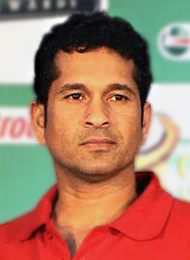
"Sachin at Castrol Golden Spanner Awards (crop)" by http://www.bollywoodhungama.com/more/photos/view/stills/parties-and-events/id/1387783
Cropped from original image. Licensed under CC BY 3.0 via Wikimedia Commons.
autobiography on Wednesday evening. While a host of cricket legends who played before his time, like Sunil Gavaskar, introduced Sachin as it were to Mumbai’s swish set and cricket enthusiasts, the presence of the golden batting quartet of the author himself, Rahul Dravid, Sourav Ganguly and V.V.S. Laxman made the day for lovers of cricket as they chatted about their careers. Tendulkar’s family his wife Anjali and brother Ajit and his first coach, Ramakant Achrekar, were present and so was his daughter Sara to whom he presented a copy of the book Playing It My Way. It was an evening of great anecdotes that had the audience either in stitches or applauding the sentiments expressed. While the recurring theme of the 1,50,000 word book of 486 pages was the story of the greatest run-getter, the greatness of Indian cricket also receives its due. A fair deal of controversy has been whipped up so far in strategic release of excerpts and it did not stop there as Tendulkar and all his mates dug it into Greg Chappell while Sachin also brought up the subject of Ian Chappell. Before the evening was out, Sachin may have said his final word on the Chappell brothers but the controversy has perhaps not ended yet. A day before too he had dismissed both of them as dissemblers in a private media party he hosted for scribes. He gave short shrift to Greg Chappell’s excuses on the captaincy issues before, during and after the World Cup of 2007. He took a swipe at the elder Chappell, saying that if Ian looked at himself in the mirror he would see multiple personalities. He demolished Greg questioning his version of events by saying his wife Anjali was there when the Aussie coach of the Indian cricket team spoke to him offering him the captaincy by snatching it from Rahul Dravid. He ridiculed Ian’s fetish of calling a spade a spade. “When he complimented me once in 2010 in Durban, I told him you have changed sides. He changes sides easily and conveniently,” Sachin said while digging into the Chappell brothers of Adelaide who wore many hats after retiring from cricket. The Chappells are likely to have more to say on the subject, but Sachin emphasised that all Indian players believed Greg was bad for Team India and for Indian cricket. He recalled travelling with Harbhajan, Laxman and others who all said they were not comfortable with Greg at the helm. Asked why he did not tell Rahul about the incident, Sachin said he was not like Chappell to play politics in the team. Sachin blamed Greg for asking him to bat at No. 4 in the 2007 World Cup and not at his favourite ODI slot at No. 2. He said the coach spoiled his mental preparation for the event by dictating the batting order. He recalled how when he was batting at No. 4 even in local games like against the Natal province India lost matches and how John Wright as coach had once asked him to tell him frankly where he wished to bat in ODIs. “I could control the innings if I batted at the top,” Sachin said. Team India players are standing by Sachin in his demolition of Greg. Whoever could make it to the venue of the book release on Wednesday evening was there at the Grand Maratha to show their solidarity with Sachin. His book is bound to cause more than a few ripples as arguably the world’s greatest batsman in cricket history says he has made an honest and sincere effort in sharing his thoughts. “I have spoken the truth,” he emphasised. It is, perhaps, up to Greg Chappell now to reflect on the issue of how he is said to have destroyed team spirit. Source: The Asian Age. Sachin Tendulkar hints at major sporting plan with Narendra Modi: Iconic Indian batsman Sachin Tendulkar has hinted that a major proposal on sports, which he has submitted to  Prime Minister Narendra Modi.It is set to be unveiled soon. At the UK launch of his much-hyped autobiography 'Playing It My Way' here, Tendulkar said the details of the plan would be released soon. The Rajya Sabha MP ruled out any plans of entering politics."I was a sportsman and will be a sportsman forever. I have handed over a proposal recently which presents my vision and the PM has been receptive," he said during the event at Lord’s Cricket Ground. Source: Article. Kapil as coach disappointed': One of the finest Indian all-rounders of all time, Kapil Dev was a "disappointment" when it came to coaching, reveals batting maestro Sachin Tendulkar in his just-released autobiography 'Playing It My Way'. Tendulkar has claimed that he was left disappointed by Kapil during one of the Australia tours since the coach never involved himself in strategic discussions. In the chapter, Tumultuous Times: India in Australia, November 1999-January 2000, Tendulkar has written that 
more/photos/view/stills/parties-and-events/id/1411924. Licensed under CC BY 3.0 via Commons.
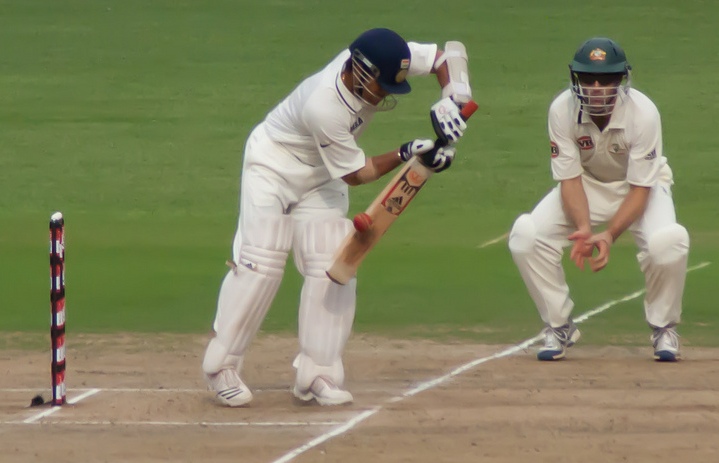
"Tendulkar batting against Australia, October 2010 (1), cropped" by Tendulkar_batting_against_Australia,_October_2010_(1).jpg:
Playing It My Way, Tendulkar reveals how it was baptism by fire in his very first Test innings. “It was baptism by fire. So much so that after my very first innings in Test cricket, during which I was all at sea against Wasim and Waqar, I began to doubt my ability to bat and question whether I was ever going to be good enough to play at international level,” Tendulkar writes in the book. “What made it (my debut) event more significant was that we were playing against Pakistan in Pakistan and their bowling attack included fast bowlers of the quality of Imran Khan, Wasim Akram, Waqar Younis and Aaqib Javed, not to mention the leg-spinners Mushtaq Ahmed and Abdul Qadir — quite a test for any debutant,” he wrote. Writing about his first tour in Chapter 3, the maestro recalled how the fiery Wasim, then in his prime, welcomed the youngster to Test cricket. “I was on strike to him for the third ball of the over, which turned out to be a vicious bouncer. Having studied Wasim’s bowling, I was convinced the next ball would be a yorker and was mentally prepared for it,” he said. “It turned out to be another bouncer, which I left. While I kept expecting a fiery yorker, balls five and six also turned out to be bouncers, and at the end of the over I said to myself, ‘Welcome to Test Cricket’” Getting used to the pressures of international cricket against arch-rivals Pakistan, Tendulkar also recalled the rising ball from Waqar in the fourth Test in Sialkot, which left him bloodied. “I had just scored my first run when Waqar bowled a short delivery, which I expected would rise chin-high. I misjudged the bounce of the ball. It rose six inches higher than expected and hit me on the flap of the helmet before deflecting and hitting my nose. “My vision was blurred and my head felt heavy. After the impact, the ball went towards the slips and my natural movement was to see where the ball had gone. It was then that I noticed all the blood spattered on my shirt,” Tendulkar said. “As I was trying to recover from the blow, I was amused by Javed Miandad’s comments. In an attempt to psyche me out, he was saying things like Arre tujhe toh abhi hospital jana parega; tera naak tut gaya hai. (You may have to go to the hospital; your nose is broken). To add to my discomfort, a banner in the stands read, Bachhe ghar ja ke dudh pie kea aa. (Kid go home and drink milk).” Source: The Asian Age. Sachin Tendulkar lauds Ajit’s role in his career: They were not in their whites and the cricketing paraphernalia was missing from their armoury, but when the four greats of Indian cricket got back together, the golden period was relived all over again. The launch of Sachin Tendulkar’s autobiography “Playing It MyPulkit Sinha from Mumbai, India derivative work: Nev1 (talk) - Tendulkar_batting_against Australia,_October_2010_(1).jpg. Licensed under CC BY-SA 2.0 via Commons. Way” saw his friends, family, teammates all joining him on an evening that unearthed unheard nuggets about India’s most decorated cricketer. “We were openers, but he never took a strike. It was always me. I think I am the only captain who had to make a request to Sachin. He never budged,” reminisced Sourav Ganguly, who first shared a room with Tendulkar when both landed up at the MRF pace academy in their early teens. Former coach Vasu Paranjape and Dilip Vengsarkar spoke about how they feared a media backlash when they thought of including him in the Mumbai team. Ravi Shastri recollected that even as a 16-year-old Tendulkar had advised him while Sunil Gavaskar praised him for his longevity. Also shedding inhibitions on the special occasion was wife Anjali, who for the first time opened about the story of their affair. “I was at the Mumbai airport to receive my mom and I saw this kid and he was so cute. I ran towards him screaming “Sachin Sachin” and he was so shy he did not look at me,” Anjali recollected. “I didn’t know he was 17 and I had seen him earlier in England, I would have been chasing a 15-year-old too.” Anjali also revealed how Ajit had instructed her to deliver the message of his father’s death. “We were not allowed to be with the team all the time. I drove back to the hotel and called up Robin Singh and Ajay Jadeja and told them to guard the room and not allow anyone inside. When I broke the news, he almost collapsed.” Tendulkar thanked his brother, the unsung hero for providing unflinching support right through his career. “There are so many things that he did for me which I am now finding out. He gave me my first bat and the helmet I wore on my debut tour to Pakistan after my retirement.”Source: The Asian Age. My family advised me not to speak: Sachin Tendulkar: He walked into the room in a pinstripe suit looking every bit the boy who popped out of newspaper pages and television screens saying ‘Boost is the secret of my energy.’ He has not aged much since his sensational international cricket debut at the tender age of 16 in 1989. With the grooming techniques of the age, he seemed as if he was an 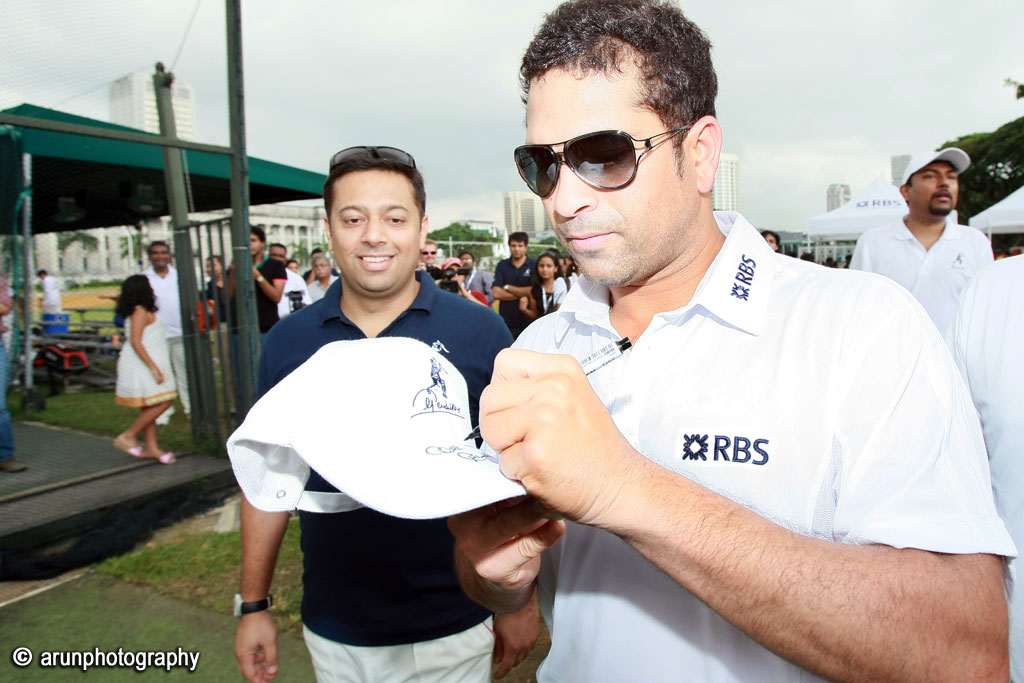
Licensed under CC BY 2.0 via Wikimedia Commons.
Sachin Tendulkar took his family’s advice and kept silent during his playing years. But now the Little Master, who’s wading into controversies, seems to be in the mood to ‘play it his way’...
airbrushed version of the little boy with the cricket bat in his hand and big dreams in his heart. The maturity was in his words. Sachin Ramesh Tendulkar speaks today with the certainty of a man who knows he had a tryst with destiny as the world’s leading batsman and entertainer and who has now set upon a journey in which he can give to others and to the society that made him into a national icon. Keeping a promised appointment with cricket writers in a luxury hotel near the Mumbai airport on the eve of the international release of his book Playing It My Way — Sachin spent the better part of two hours explaining why he wrote the book. “I come from a literary family. My father was a writer. An elder brother writes. I said to myself that I cannot let down the family tradition. Why not I write too was reason enough.” Having spoken up on controversial subjects and freely expressed himself on eventful incidents in Indian cricket, Sachin justified his wading into controversies now. “My family advised me not to speak out during my playing career. I had an important job on hand and that was to score runs for India and help win matches. Speaking rather than letting the bat do the talking would take away my energy,” he explained giving credit to his family liberally in keeping him focused on the game. “I thought this was a good opportunity to write a book and thoroughly enjoyed it. I wanted to share some things that were funny and some what you call controversial. I wanted to play it my way,” he said cheekily.” Recalling an early experience with the media, Sachin pointed out how how his batting guru Achrekar’s stinging rebuke put him on a path of truth in his life. “I made 24 in my first match for school and the scorer who would give the match scores to newspapers said why not make it 30 so that my name appears in the papers. I said if you can do it, why not? My Sir caught me. He scolded me the next day. He said achieve things in life on your strengths. In Marathi those words really drove the message into me.” With his mother in hospital and a brother in somewhat delicate health after a bypass surgery, Sachin could easily have excused himself from the myriad events he took part in towards promoting his book. In the words that flowed from him in a voice far more manly than the squeaky timbre of youth brought out the family values that have driven this man throughout his life. He is the very embodiment of the Indian environment of family subsuming the individual. He thanked his wife Anjali and his family for standing by him in good times and bad, in stress and in happiness, in victory and defeat. Asked if he had analysed the reasons why he was a relative failure as a captain when compared to his phenomenal record with the bat, Sachin said he had addressed the issue in his book. “I never believed in criticising my players. If you go back and look at the scoreboard you will find we never had a team to take 20 wickets or put up big totals. There were matches we should have won which we lost and that disappointed me most. Sport is a mixed package, you win some and you lose some,” he said philosophically in summing it all up. Have you heard anytime of Sachin breaking down and crying like a baby? That is what he did in his room in a resort in Bridgetown on the night after the Team’s failure to chase 120 to win in Barbados a Test in 1997. He wept inconsolably with only Anjali to comfort him and get him to stop sobbing. It is when the anxieties started bothering him and he was thinking of his captaincy failures even while out at dinner with his wife did he realise that captaincy was not his cup of tea. “I was beginning to change as a person. It was bothering me. I know captaincy has little to do with two guys batting out there and scoring runs. But it was not for me anymore,” he said. The certainty with which he spoke on issues was the definitive pointer to a clear thinking person. He was at total ease in the company of people he had seen on and off over the years. He could have easily escaped after the grilling hour and a half of questions. He stayed on to pose for endless pictures with handheld cameras and devices. He brushed away the ‘No pictures’ rule laid down by those behind the closed media event and obliged everyone if they wanted a snap or a selfie with one of India’s most famous personalities. Never mind if Maria Sharapova has not heard of him. The photo op and photo bombing session went on and on before the young man excused himself after a round of mimicry by scribes of some legends of Indian cricket, which brought out the youth in Sachin again as he laughed his guts out. The nominated Member of Parliament has set himself goals in major social projects that he will be unveiling shortly. The young man has things to do once the book released on Wednesday evening in his home town. He has miles to go yet. Source: The Asian Age. Sachin sends bouncer Chappell's way, Dravid in the
"Sachin at the other end" by Vikas - IMGP2797 (Large). Licensed under CC BY 2.0 via Commons.
Tendulkar in his book blames Chappell for the 2007 WC debacle, saying Indian cricket was going nowhere under the Aussie. (AP Photo)
centre: Dropping a bombshell, Sachin Tendulkar has disclosed that the then India coach Greg Chappell had made a "shocking" suggestion to him to take over India's captaincy from Rahul Dravid months before the 2007 World Cup in West Indies. "Together, we could control Indian cricket for years," the Australian told Tendulkar during a visit to his home when he offered to "help me in taking over the reins of the side" from Dravid, the master batsman writes in his autobiography "Playing it My Way" due for release on Thursday. Tendulkar is scathing in his criticism of Chappell who was the national coach from 2005 to 2007, describing him as a "ringmaster who imposed his ideas on the players without showing any signs of being concerned about whether they felt comfortable or not". Elaborating on the coach's bid to replace Dravid, Tendulkar writes, "Just months before the World Cup, Chappell had come to see me at home and, to my dismay, suggested that I should take over the captaincy from Rahul Dravid." "Anjali (Tendulkar's wife), who was sitting with me was equally shocked to hear him say that 'together, we could control Indian cricket for year', and that he would help me in taking over the reins of the side. "I was surprised to hear the coach not showing the slightest amount of respect for the captain, with cricket's biggest tournament just months away," Tendulkar writes. He says that he had rejected Chappell's proposition outright. "He stayed for a couple of hours, trying to convince me before finally leaving". So disgusted was Tendulkar with Chappell's suggestion that a few days after the episode "I suggested to the BCCI that the best option would be to keep Greg back in India and not send him with the team to the World Cup". Tendulkar had suggested to the Board that senior players could take control of the side and keep the team together. "That is not what happened, of course, and the 2007 campaign

ended in disaster," he writes in the book excerpts of which were made available exclusively to PTI by publishers Hachette India. India's 2007 World Cup campaign ended in a fiasco with the team winning only one of the three group matches against lowly Bermuda, and losing to Bangladesh and Sri Lanka. Lashing out at Chappell, Tendulkar says that the Australian must take a lot of responsibility for the mess resulting from India's performance in the World Cup. "I don't think I would be far off the mark if I said that most of us felt that the Indian cricket was going nowhere under Chappell". Chappell was publicly questioning "our committment and instead of asking us to take fresh guard, was making matters worse", writes Tendulkar in the book co-authored by noted sports journalist and historian Boria Majumdar. The master player says that several senior players were relieved to see Chappell go, "which was hardly surprising because, for reasons hard to comprehend, he had not treated them fairly". Tendulkar cites the coach's attitude towards Sourav Ganguly which he describes as "astonishing". He writes," Chappell is on record as saying that he may have got the job because of Sourav but that did not mean he was going to do favours to Sourav for the rest of his life. "Frankly, Sourav is one of the best cricketers India has produced and he did not need favours from Chappell to be part of the team". Tendulkar writes that Chappell wanted to drop senior players from the team. "Chappell seemed intent on dropping all the older players and in the process damaged the harmony of the side. On one occasion, he asked VVS Laxman to consider opening the batting. Laxman politely turned him down, saying he had tried opening in the first half of his career because he was confused, but now he was settled in the middle order and Greg should consider him as a middle-order batsman. "Greg's response stunned us all. He told Laxman he should be careful,

because making a comeback at the age of thirty-two might not be easy." "In fact, I later found out that Greg had spoken to the BCCI about the need to remove the senior players, no doubt hoping to refresh the team," the maestro writes. The 41-year-old player was critical of the former Australian coach's propensity to hog limelight when the going was good but had the habit of leaving the players in the lurch when all went downhill. "I also remember that every time India won, Greg could be seen leading the team to the hotel or into the team bus, but every time India lost he would thrust the players in front. In general John and Gary always preferred to stay in the background, but Greg liked to be prominent in the media." Tendulkar recollected how disappointed they were after the shock first round exit during the 2007 World Cup and how he was hurt when people questioned the commitment of the Indian players. "After we returned to India, the media followed me back home and it hurt when I heard my own people doubting the commitment of the players. The media had every right to criticize us for failing, but to say we were not focused on the job was not fair. "We had failed to fulfil the expectations of the fans, but that did not mean we should be labelled traitors. At times the reaction was surprisingly hostile and some of the players were worried about their safety," he writes. Tendulkar said that the thought of retirement did cross his mind after the 2007 Cup debacle but family and friends insisted that he should carry on. "Headlines like 'Endulkar' hurt deeply. After eighteen years in international cricket, it was tough to see things come to this and retirement crossed my mind. My family and friends like Sanjay Nayak did all they could to cheer me up and after a week I decided to do something about it. I started to do some running, to try to sweat the World Cup out of my head." Source: Hindustan Times. Dravid knew it all but could not control Chappell: Ganguly: Sourav Ganguly on Monday disclosed
that Rahul Dravid was aware of what Greg Chappell was up to during his stint as India coach but he "could not control" the Australian. Ganguly's comments came after excerpts from Sachin Tendulkar's autobiography revealed that Chappell had made a "shocking" suggestion to Tendulkar to take over India's captaincy from Dravid months before the 2007 World Cup in the West Indies. "I really don't want to go back to that period, you have seen it in the results. (It was) one of worst phases of Indian cricket and worst phase a cricketer can go through, especially someone like me. There were lies after lies and six months later he wanted Rahul removed and Sachin as captain. This goes on to show how the man went about his job," said Ganguly. "I was not surprised to see India not qualifying for the next round (in 2007 World Cup). When I came back to the team, I had spoken to Dravid about that much later and told him that these were the things going on. He said he knew it all but 'couldn't control Greg'," Ganguly disclosed. Asked to throw some light on Tendulkar claiming in his book that Chappell once told him 'I have got the job because of Sourav but that did not mean he was going to do favours to Sourav for the rest of his life', Ganguly asked, "Is it?" Expressing surprise at the disclosure, Ganguly said, "I haven't heard about that before. This must be closed door discussion between Chappell and Sachin. But I presume it is true and I think it is absolutely ridiculous." He said Chappell was someone who could not be trusted. "I lost my captaincy in 2005 November-December and World Cup was in early 2007. Rahul became the captain. And another eight months time, he needed another captain (in Sachin). It goes to show his thoughts, goes to show what damage he has done to Indian cricket, goes to show the character of the man. He is someone who cannot be trusted whether its Ganguly, Dravid or Tendulkar," Ganguly told 'Headlines Today'. Asked about the dressing atmosphere around the time VVS Laxman was asked to open the innings by Chappell, Ganguly said, "When the Laxman episode happened I was not in the team. But I had experienced similar things and it happened during my time also. "I am happy to see the way Tendulkar has written the book. Today he has done a lot of help to Indian cricket and hopefully it is an eye-opener to all. Happy that Sachin has written about true facts of that period," he said. Ganguly wished he could some day tell his side of the story as well. "Lot of things were written (about me) and I lost my captaincy. Later I came back to the team and played for India But it was not very good. "I am happy that someone of Sachin's credibility has spoken about it. I wish some day I could tell my side of the story. Right from the Zimbabwe tour to the next one or one-and-a-half years. I have restrained myself from doing that but I am happy that Sachin has done it," he concluded. Source: Hindustan Times, Not privy to discussions between Sachin and Greg: Dravid: Foremr India captain Rahul Dravid said he was never "privy to any private conversation between
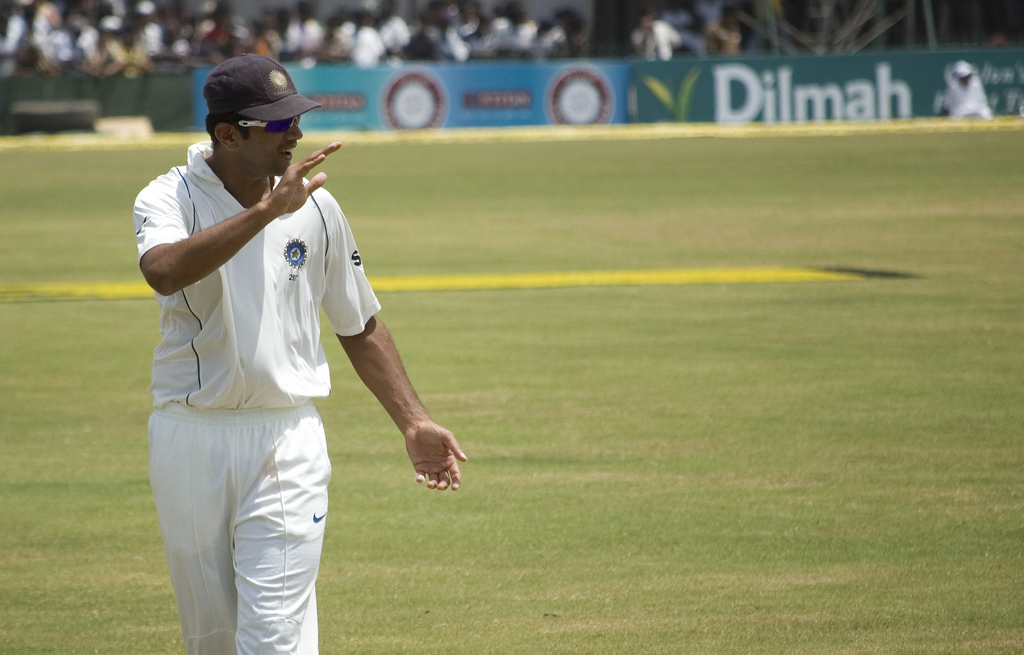
"Rahul Dravid - moving the field" by Hashir Milhan from Colombo, Sri Lanka - The Dravid. Licensed under CC BY 2.0 via Commons.
two individuals" about Sachin Tendulkar's revelation in his upcoming autobiography about Greg Chappell wanting to remove the Karnataka stalwart from captaincy before 2007 World Cup. Tendulkar in his upcoming autobiography 'Playing It My Way' has written that Chappell came to his residence before the World Cup and suggested about making him the Indian captain at Dravid's expense. "I haven't really read the excerpts of that book. Also I am not privy to any private conversation between two individuals. I have not heard about this before and I have no idea what happened and I would not want to make any comment," Dravid told ESPN Cricinfo. However Dravid said that it has been seven years (since 2007) since that World Cup and it doesn't make much of a difference to him. "It's been a long time and it does not make much of a difference to me now," said Dravid. However on a different note when asked if he was looking forward towards reading the book after this sensational revelation, Dravid said, "Not looking forward towards reading this but yes anything that Sachin writes on batsmanship and things like what made him the best in the world. I am more interested in reading those parts," Dravid said, Source: Hindustan Times, Sachin Tendulkar urges Indian players to follow his English example: Sachin Tendulkar may have written off England's chances of winning next year's World Cup but that hasn't stopped the India great urging his compatriots to broaden their horizons with a spell in English county cricket. England have never won the World Cup in nearly 40 years of trying and, having lost five out of their last six

one-day international series, few expect them to end that sequence in Australia and New Zealand next year. Tendulkar, who retired from cricket last year having become the first man to score 100 international centuries and been India's leading run-scorer during their march to the 2011 World Cup title, was among the sceptics when it came to assessing England's chances. "I think Australia, South Africa, New Zealand are a dark horse, and India -- these four should be my semi-finalists," Tendulkar said at a press conference at London's Lord's Cricket Ground on Friday, where he was promoting his autobiography, 'Playing It My Way'. "Do England have a chance? Not really. I don't think so. "Anything is possible in this sport but going on current form I don't think England will be that competitive. "I feel India can surprise a lot of people and I also believe the spinners will come into play. "People talk about the pitches for fast bowlers but because of the size of the grounds, I think spinners could be important." India have long proved tough to beat in home conditions but have often struggled on their travels, particularly in recent times, and were beaten 3-1 in a five-Test series in England earlier this year. Tendulkar said he thought increased exposure to English conditions would benefit Indian players, citing his own experience as a 19-year-old when he became Yorkshire's first overseas cricketer in 1992. Unforgettable Yorkshire: "I grew up watching cricket being played in England and the reason I wanted to start playing cricket was because of the 1983 World Cup (that India won in England)," the 41-year-old Tendulkar said. "My first Test 100 also took place in England at Old Trafford, which was a big moment for me. "And in 1992, the first time I played for Yorkshire was a turning point in my career because it taught me about the conditions but it also taught me a lot as a person. "I thoroughly enjoyed my time at Yorkshire -- they were all very supportive and welcoming and I can never forget that experience, the warmth I felt there. "England will always have a special place in my heart and my mother-in-law is English, so I have to be careful what I say about England!," added Tendulkar. After the end of India's recent tour of England, top-order batsman Cheteshwar Pujara had a brief stint with Midlands county Derbyshire. But Tendulkar said playing more in England would benefit India's bowlers too as he recalled the experience of left-arm paceman Zaheer Khan, who took 78 wickets for Worcestershire in 2006. "I remember Zaheer Khan was having a lot of injuries and there was a period when he was away from cricket for a while," said Tendulkar. "I told him there was no off-season for him -- when the monsoons are in India, he needed to go to England and he would be transformed as a cricketer. "He did that, played a couple of seasons in English county cricket and I think that transformed him as a bowler." Source: The Asian Age. Sachin Tendulkar tips India to win Cup, picks New Zealand in last four: Batting legend Sachin Tendulkar believes
India stand a good chance of winning the next World Cup. He was asked to make his forecast for the 2015 championship at the launch of his autobiography at Lord’s Cricket Ground late on Friday. “I feel India can surprise a lot of people and I also believe the spinners will come into play,” he said. “People talk about the pitches for fast bowlers but because of the size of the grounds, I think spinners could be important,” he added. Tendulkar, who retired from cricket in November 2013, was India’s leading run-scorer in the team’s 2011 World Cup triumph. “I think Australia, South Africa, New Zealand are dark horses, and India — these four should be my semi-finalists,” Tendulkar told reporters at the launch of Playing It My Way. Asked if England stood a chance, he expressed his doubts. “Anything is possible in this sport but going on current form I don’t think England will be that competitive,” he said. Source: Article. Sachin Tendulkar's much-awaited autobiography
/more/photos/view/stills/parties-and-events/id/4628555. Licensed under CC BY 3.0 via Commons.

"Tendulkar goes to 14,000 Test runs" by Pulkit Sinha from Mumbai, India - Sachin gets to 14000 runs.
Licensed under CC BY-SA 2.0 via Commons.
set to release on Nov 6: The much-awaited autobiography of batting icon Sachin Tendulkar will hit the stands on November 6 with a high-profile release of the book in his home city Mumbai. The book, titled 'Playing It My Way', will be published worldwide by Hodder and Stoughton and by Hachette India in the Indian sub-continent. The book has been co-authored by renowned cricket historian and media personality Boria Majumdar. "I knew that agreeing to write my story would need me to be completely honest, as that's the way I have always played the game. It would require talking about a number of aspects I have not shared in public before," said Tendulkar in a press release issued by the publishers. "So here I am, at the end of my final innings, having taken that last walk back to the pavilion, ready to recount as many incidents as I can remember since first picking up a cricket bat as a child in Mumbai thirty-five years ago," Tendulkar added. "My autobiography will be available on Nov 6th... Excited," Tendulkar tweeted. The front cover of the book shows Tendulkar raising his bat while walking away from the field one last time after his knock of 74 against the West Indies at the Wankhede Stadium on Nov. 15. Source: Article, Tendulkar's autobiography - Ayaz Memon comments: Sachin Tendulkar's autobiography 'Playing It My Way' has created a storm of controversy even before its release. Tendulkar has questioned former Indian cricket team coach Greg Chappell's style of working, calling him a ring master. He has also accused Chappell of creating rift in the team. As this book is to be released today, everyone is waiting to know what more stunning revelations would be there in it. To discuss the matter, we have with us sr. sports journalist & cricket commentator Ayaz Memon. Tendulkar almost quit after captaincy debacle: Sachin Tendulkar felt so "scarred" and "devastated" by the Indian team's losing streak under his captaincy that he contemplated leaving the game in the late 1990s, the master batsman has written in his autobiography. In the much-awaited book 'Playing It My Way', which will be released on November 6, Tendulkar has spoken about his frustrating captaincy tenure from 1996 to 2000 when he led in 25 Tests, losing nine and winning just four. "I hated losing and as captain of the team I felt responsible for
"Cricket Partnership" by Privatemusings - Own work. Licensed under GFDL via Commons.
the string of miserable performances," Tendulkar wrote in the book, extracts of which were released by the Press Trust of India on Sunday. "More worryingly, I did not know how I could turn it around, as I was already trying my absolute best. I confided in Anjali (his wife) that I feared there was nothing more that I could do to stem the tide of defeats. "Losing a string of very close matches had left me badly scarred. I had given it everything and was not sure that I could give even 0.1 per cent more. "It was hurting me badly and it took me a long time to come to terms with these failures. I even contemplated moving away from the sport completely, as it seemed nothing was going my way." Tendulkar, a national icon who played at the top level for 24 years, retired last year as the world's highest run-getter in both Test and one-day cricket and the only batsman so far to score 100 international centuries. But it was almost 16 years before he quit that Tendulkar nursed the idea of leaving the game. It followed the tour of West Indies in 1997 when, after drawing the first two Tests, India were shot out for 81 in the third Test in Barbados chasing a modest target of 120. "Monday, 31 March 1997, was a dark day in the history of Indian cricket and definitely the worst of my captaincy career," Tendulkar writes in the book. "Frankly, there can be no excuses for such a poor batting effort, even though it was a difficult track. None of the batsmen apart from (VVS) Laxman even reached double figures in the second innings and it was one of the worst batting displays I have been part of. "The defeat left me totally devastated and I shut myself in my room for two whole days trying to come to terms with the loss. I still feel the pangs of that defeat when I look back at the series." The collapse was engineered by fast bowler Ian Bishop who claimed 4-22, while Curtly Ambrose and Franklyn Rose chipped in with three wickets each. The West Indies won the five-match series 1-0. Source: Article, Tendulkar bats for DRS, wants it

kroome111/FrankHerholdt#4965778410184572946. Licensed under CC BY 3.0 via Commons.
implemented across the board: India may continue to resist the Decision Review System (DRS) but there is a place for technology in cricket as long as it is the same for every leading nation, former captain Sachin Tendulkar said on Friday. DRS consists of Hawk-Eye, Hot Spot and Snickometer, although the use of the last two components varies around the globe. Hot Spot, for example, did not feature at the 50-over World Cup in 2011. The International Cricket Council (ICC) says the use of the review system is not mandatory and is only used when there is agreement between national boards. The Board of Control for Cricket in India (BCCI) refuses the use of technology in their international matches, saying the system is not foolproof and is expensive. Tendulkar, the leading run-scorer in test history who is now retired from the sport, supports technology but only if Hot Spot and the Snickometer are used in tandem. "I don't know right now what BCCI's stance is. From an individual point of view, I can definitely say that we can't have bits and pieces in different parts of the world," said Tendulkar as he spoke at the launch of his autobiography 'Playing It My Way' at Lord's. "One part of the world is using Snickometer, the other part of the world is Hot Spot," he told reporters. "Somewhere else we are using something else - it's got to be standardised. "Why should we settle for a 50% result? Why not get close to 100%. There will be some errors here and there but why don't we put together a package that is standardised all across the world," said Tendulkar. "An international match is an international match, wherever it is played. I feel it is unfair on the lesser teams who do not have that full package." Source: Hindustan Times. Nasser Hussain is the Best Captain I Have Ever Faced: Sachin Tendulkar:Indian Cricketing Legend Sachin Tendulkar has named Nasser Hussain the best captain he ever played against. Tendulkar believes that he was an 'excellent strategist' despite occasionally deployed 'negative' tactics. Speaking in his new autobiography, 'Playing It My Way', serialized in The Times, Tendulkar quoted: "Among the captains I spinner Ashley Giles to bowl to me outside my leg stump from over the wicket, for example - he was a very good thinker about the game and was proactive. "He played against, I consider Nasser Hussain the best. "He was an excellent strategist and even if some of his tactics occasionally bordered on the negative - using the left-arm would not place a fielder in a particular position after a shot was played. Rather, he had the ability to anticipate the shot and would place a fielder well in advance, making a real difference to the team. "Nasser and Giles were counting on the fact that I would have limited scoring options off balls bowled there and were hoping to frustrate me and induce me to play a false shot. They has essentially given up any 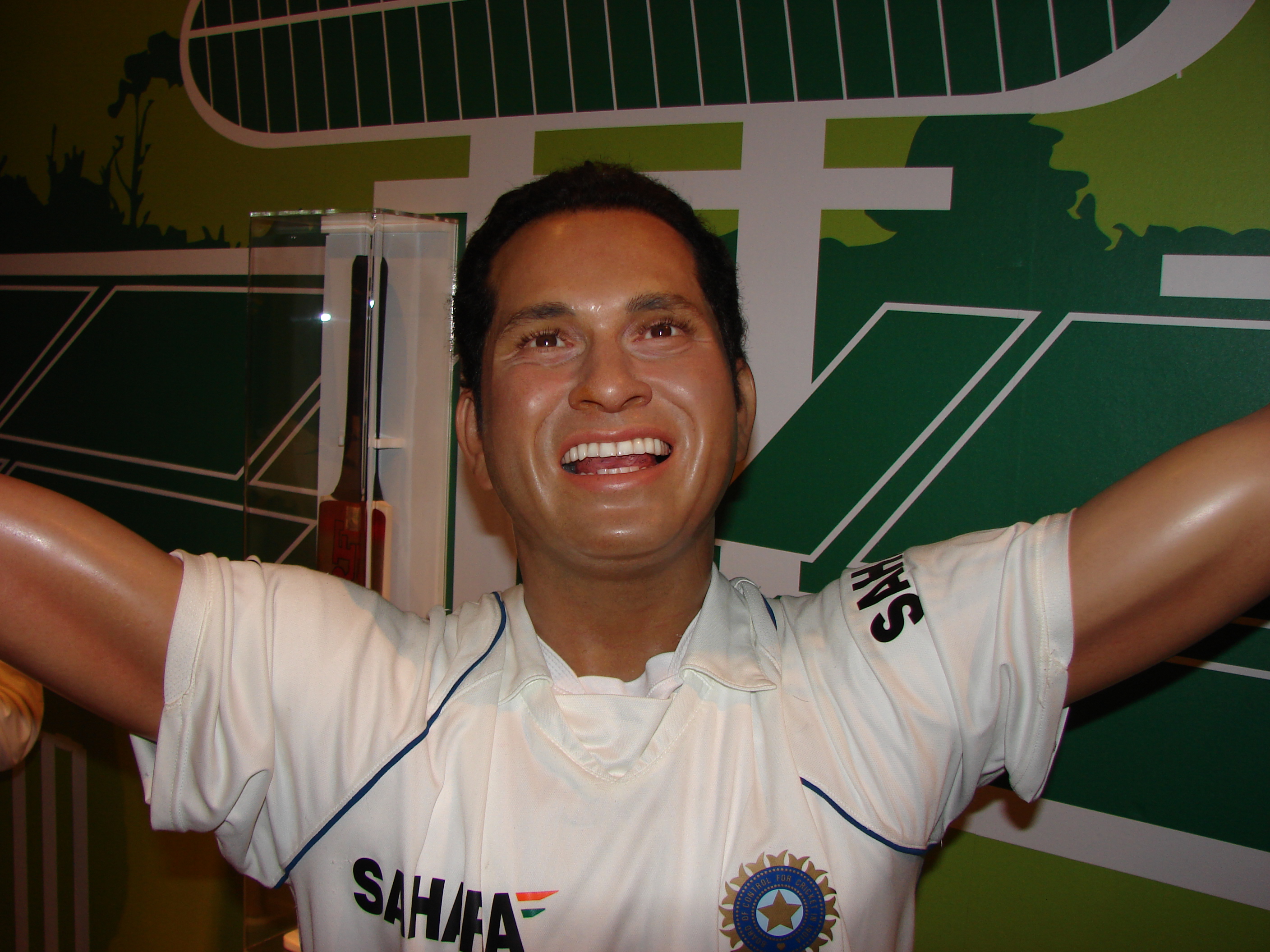
"Sachin Ramesh Tendulkar Wax Statue in Madame Tussauds London" by Mvkulkarni23 - Own work. Licensed under CC BY-SA 3.0 via Commons.
MS Dhoni and N Srinivasan forced me to retire: Sachin Tendulkar
attempt to get me out in favour of trying to get under my skin." Source: Sportzwiki.com. Sachin Tendulkar's autobiography sale to help NGO: Mumbai-Based NGO Apnalaya will be a beneficiary of Sachin Tendulkar's autobiography 'Playing it My Way' as proceeds from its sale will be given to the organisation for fighting malnutrition in children: "Sachin has committed a part of his proceeds from the sale of the autobiography to Apnalaya in their fight against Malnutrition in Children and provision of clean drinking water. Source: Article. Highlights: Monkeygate to Multan and partnership with
Anjali, HT Correspondent, HT presents some excerpts from the much-awaited biography. Read on to know how Sachin's partnership with Anjali started, how he felt about the captains with whom he has represented the side, how he reacted after the Multan declaration, what he felt about Chappell and many more. 'Greg's tenure worst of my career': Greg's tenure as coach was the worst of my career. There is no doubt we failed as a collective in 2007, but his high-handed manner added to our disappointment and, in the immediate aftermath of defeat, had a harmful impact on Indian cricket. Unwelcome opinions: The outrage in India after the 2007 World Cup was not helped by armchair experts who were sitting thousands of miles away but still passing judgement on Indian cricket and suggesting I should 'have a good long look into the mirror' and think about retiring. Such opinions, which were published in Indian newspapers, provoked fans across the country. I have never quite understood why Ian Chappell, who was merely reporting on the game, should have got a headline
in the Indian press. Would any of our former players commenting on Ricky Ponting or Michael Clarke have had a headline in the Melbourne Age or the Sydney Morning Herald? Chappell would have done better to stick to Australian cricket. I remember meeting Ian Chappell in Durban in 2010 during the CLT20... I bumped into him as I was coming out of a health club after a session in the gym with my physio, Nitin Patel, who was party to the entire exchange. Ian started the conversation by saying that now he knew the secret behind my scoring big runs. I reminded him that he was conveniently changing his stand, considering what he'd written in 2007. I said to him that I had not done what he suggested back then because I was well aware of what I needed to do and how much cricket I had left in me. I also said that critics like him change with the wind. When the going is good, they write positive things and when the going gets tough, they start making a lot of negative comments without ever trying to find out what actually is going through a player's body or mind. He then asked me if I had changed the weight of my bat. I told him that I hadn't changed a thing and was doing exactly what I had been doing for twenty long years. He was the one who had conveniently changed his opinion because I had been scoring heavily between 2008 and 2010. Finally the conversation moved to Greg. I told Ian bluntly that Greg had not been popular and I would not want to share a dressing room with him again. Ian attempted to argue that Greg had always had a problem trying to understand failure... I said that that was not my concern and all that mattered to me was that he had failed to take Indian cricket forward. Ian was most surprised to hear all this. In fact, Nitin Patel told me soon after that I was the last person he had expected to lash out like this. The Multan declaration that hurt the most: …Disappointed and upset, I
 made my way back to the dressing room and could sense that the whole team was surprised at the decision (Rahul Dravid declaring with me stranded at 194). Some of my team-mates perhaps expected me to throw my gear about in the dressing room in disgust and create a scene. However, such things are not in me and I decided not to say a word to anyone about the incident. I calmly put my batting gear away and asked John Wright for a little time before I went out to field because I was feeling a little tight after batting for so long. Inside I was fuming. Just as I was washing my face in the bathroom, John walked up to me and apologized. He was sorry about what had happened and said he had not been party to the decision. I was surprised and said to him that as coach he was one of the decision-makers and there was no reason for him to be sorry if he believed in what had been done. I also said that what was done could not be reversed and it was best to leave it alone. Finally, I couldn't help reminding him that the declaration was contrary to what had been discussed at tea and it was strange that I was not given even one ball to get to my double hundred after a message had been sent out asking me to get there as quickly as possible. Rahul said that the call was taken with the interests of the team in mind. It was important to demonstrate that we meant business and were keen to win. I wasn't convinced. First, I said to him that I was batting for the team as well. The 194 was meant to help the team and it was my individual contribution to the team's cause... Learning from history: A similar 
"Yuvraj Singh fielding" by Blnguyen - My photo. Licensed under CC BY-SA 3.0 via Commons.
situation arose in December 2008 when we were playing England at Mohali. It was the last day of the Test and Gambhir and Yuvraj were both in the seventies... It was being argued that we needed to declare immediately and put the English in for some thirty overs so that we could try and force a win. I intervened. Dhoni was our captain and Gary Kirsten our coach. I said that I had been in this situation before and did not want a repeat of what had happened to me. Monkeygate: Was surprised Aussies complained: ... Bhajji had gone past 50 when it all started. For a number of overs he had been telling me that Andrew Symonds was trying to get him riled. …Bhajji had playfully tapped Lee on the back after completing a run and Symonds at mid off took exception to this. He apparently did not want an opposition player meddling with Lee and once again hurled abuse at Bhajji. Bhajji is an impulsive and passionate individual and it was only a matter of time before he would retaliate, which he soon did. That was the start of the controversy that almost caused the tour to be called off. I want to state very clearly that the incident arose because Andrew Symonds had been continually trying to provoke Bhajji and it was inevitable that the two would have an altercation at some point. While walking up to Bhajji to try to calm things down, I heard him say 'Teri maa ki' (Your mother…) to Symonds. It is an expression we often use in North India to vent our anger and to me it was all part of the game. In fact, I was surprised to see umpire Mark Benson go up to Bhajji and speak to him. While the umpire was talking to Bhajji, some of the Australian players started to warn him of the dire consequences of his words, presumably to rattle him and disturb his concentration. The ploy paid off when a few overs later Bhajji was out for 63. I thought the matter had ended with Bhajji's dismissal and later I was surprised when I was told that the Australians had lodged a formal complaint at the end of that day's play, apparently alleging that Bhajji had called Symonds a 'monkey', which was being treated as a racial insult. What surprised me most was the haste with which the Australians had lodged their complaint. I was later informed that it had apparently been agreed between the Australian and Indian boards during their tour of India in October 2007, following an incident in Mumbai, that the respective captains were to report to the match referee any incident with a racial element. Even so, I still believe that the matter would not have been blown so out of proportion if Ponting had discussed it with the captain Anil Kumble, Harbhajan and the Indian team management before reporting the incident to Mike Procter, the match referee. In turn, Mike Procter could also have handled the matter with a little more sensitivity… In the IPL: In the fourth season of the IPL in 2011, Symonds and Bhajji played for the Mumbai Indians. I clearly remember our first meeting with Andrew when he joined the team. I told him that the Sydney controversy of 2008 was in the past and that neither I nor Harbhajan would ever refer to the incident... Andrew, on his part, reciprocated the camaraderie and we became good 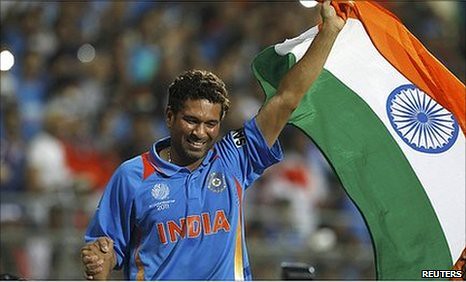
friends. World Cup celebrations, a night to remember: Marine Drive was quite a sight. Although I remember dancing and celebrating as a kid after India's first World Cup win in 1983, the memory is a bit of a blur. This was our moment. It was liberation. I had finally scaled cricket's Everest and each and every soul on the streets of Mumbai was celebrating. We had brought joy to their faces and that's all we could have asked for as Indian cricketers. In the confines of my room, Anjali and I poured each other a drink and let our hair down. We plucked flowers out of the bouquets that were piled everywhere and put them behind our ears and started dancing to the music. This was the night of a World Cup triumph, so why should we restrain ourselves? In an instant all that time away from my family, missing out on seeing my children grow up, seemed worthwhile. Their father had finally become part of a World Cup-winning team, something he had strived for all his life. I have enjoyed playing under all my captains: All of the people I recommended or played under after giving up the captaincy - Sourav Ganguly, Rahul Dravid, Anil Kumble or MS Dhoni - I had a good relationship with, and when I felt it necessary I would give them my opinion and then leave it to them to take the final call…. Every captain I played under had his respective strengths. Sourav was an excellent strategist and had a very good understanding of the game. He was an aggressive captain and wasn't afraid to experiment in difficult situations. It was under Sourav that we started winning overseas Test matches consistently. Anil Kumble was an excellent communicator and clearly explained to the
with Anjali: I had just landed in Mumbai on our return from the 1990 tour of England and was waiting to pick up my bags when I first saw an extremely attractive woman looking down from the viewing gallery in the airport… when I was making my way out of the airport… I spotted Anjali, dressed in an orange T-shirt and blue jeans, running out of the gate, apparently chasing after me. That was not all, because she soon started yelling, 'He is sooooo cute!' I felt awkward and started to blush, as I knew both Ajit and Nitin were waiting outside to take me home… It was pure chance that I happened to pick up her call…. She said she was the girl from the airport and asked if we could meet. While not trying to sound too eager, I told her that I remembered her and could meet with her at the Cricket Club of India…. At first she did not believe me and asked if I could remember what she was wearing on the day I had first seen her. When I mentioned the orange T-shirt and blue jeans, she was impressed. Our first proper meeting finally happened at my house when we came up with the idea that Anjali should come over posing as a reporter…. A female reporter had never come to my home…and, in light of all the phone calls, my sister-in-law was particularly suspicious. When 'muscles' risked his life: The story of the Australia tour is incomplete without a story that has stayed with me over the years. It involves Venkatapathy Raju, our left-arm spinner, and Merv Hughes. They were great pals and on a flight to Perth, which is a little under four hours from Sydney, we dared Raju, one of the skinniest cricketers in the team, to go and grab Hughes's famous thick moustache. Merv, a huge man, was known for his volatile temper and most of us were convinced that Raju would chicken out in the end. To our surprise, he boldly went up to Merv and pulled his moustache, a feat of incredible bravery - or foolishness. Merv took it all very sportingly and the act was applauded by everyone on the flight, making Raju a hero. When Sourav ducked for cover: Off the pitch, one incident from this tour is difficult to forget. Sourav Ganguly and Navjot Sidhu were travelling on the Tube in London when a few young guys, who'd probably had a bit too much to drink, boarded the train. For some reason they started making gestures at Sourav and Navjot and eventually one of them threw a beer can at Navjot, who promptly stood up to confront them. It turned ugly and a fight ensued, until the train reached the next station, where their attackers staggered off - but then one of them came back onto the train and started waving a gun at Navjot. At this, Sourav's first reaction was to drop to the ground and cover his face in fright, but then he started pleading with the boy and dragged Navjot away as quickly as he could. Looking back at the incident, it seems a funny scene in some ways, but it must have been pretty scary at the Source: Hindustan Times. Autobiography on the way: What has Sachin Tendulkar written? Manu Joseph: Frank Sinatra’s ‘My way’, the song Sinatra himself came to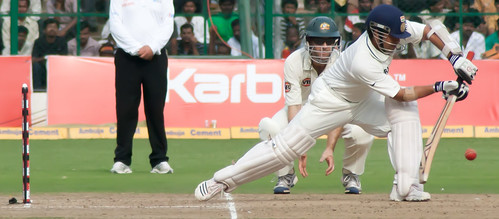 players what he wanted from each of them. He was aggressive and trusted his instincts. Sourav and Anil were both great players and equally capable leaders. Rahul was more conventional. He was more methodical and his mental toughness was an added strength. He was committed to the job but stayed away from experimenting too much. Dhoni, in contrast, was impulsive and loved to back his instincts. He has a really good grasp of the game and is not afraid to try something different. He is never flustered and handles pressure well... I enjoyed playing with them all. Unceremonious sacking: Tendulkar wrote in his book that his "unceremonius" removal from captaincy in 1997 was "humiliating". "... I was unceremoniously sacked as skipper. No one from the BCCI managed to call me or inform me of my removal as captain before someone from the media called to say I was no longer captain," he writes. "I told myself that the BCCI mandarins might be able to take the captaincy away from me, but no one could do the same as far as my own cricket was concerned." "During my tenure as captain some of the players used to call me 'skip', so when one of the players shouted out 'skipper' in our next engagement in Dhaka, I automatically turned around to answer the call. That's when it really hit me that I was no longer the captain of the Indian cricket team.... Now I simply had to focus on my batting and win some matches for the team. So that's what I did." Beginning of the partnership  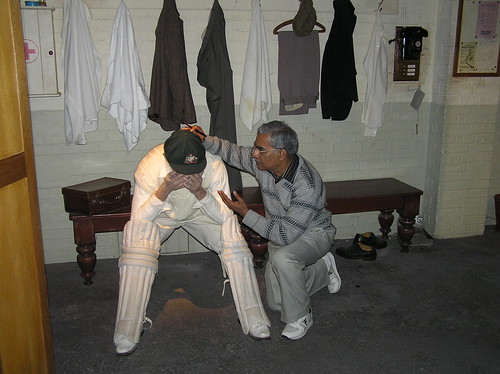 loathe, and is a lift of the French song ‘Comme d’habitude’, whose most popular YouTube video has the appeal, for some reason, ‘Sign against animal torture’, but is nevertheless the anthem of men who have taken a Harley down a highway, climbed a hill, smoked weed, hence imagine they have bitten off more they could chew, has often lent itself to the titles of male memoirs. Even so, it is odd that Sachin Tendulkar’s autobiography should be called ‘My Way’. To be precise, the book, which will be released in a few days, is titled, Playing it My Way. Tendulkar’s fortune was that life never gave him a reason to go astray, and the roads that he wished to take were the paths approved by the establishment. He adored and obeyed his parents, he wished to hold his cricket bat straight, he revered his coach, married the girl he loved, stayed in the marriage, and raised exactly two children. As a batsman he showed that style is in its core an action done absolutely right, exactly the way elders said it has to be done. He was what the norms had prophesied. And he made theory look good. When he dealt with people he often chose the option of respect. Humility as a state of mind is a  form of intelligence, but as a physical expression it is an inexpensive ruse to reassure the ordinary that their ordinariness is not pitiable. In him humility was both wisdom and a trick. He spoke his mind in private to his team, but not to the public, whom he never granted the right to information. He never entered public spats because he knew it was inelegant, an abstinence that was conceit misunderstood as decorum. He carries within him the fear that makes men good, the fear of being seen as bad. His autobiography should have been called, ‘Memoirs of a Decent Man’. As most honest titles would to memoirs, this one would have destroyed the prospects of the book. About five years ago, when Raj Thackeray and his party were claiming that Mumbai belonged to Maharashtra first, whatever that meant, the sports journalist Akshay Sawai asked Tendulkar his opinion during a press conference. Tendulkar said,  “Mumbai belongs to India. I’m a Maharashtrian. I’m extremely proud of being Maharashtrian. But I’m an Indian.” In other words he said almost nothing, but he regretted saying even this and later conveyed that he was offended by the question. What could such a cautious public figure have written in his memoir? How honest can he be and would want to be? That too in an age and a nation where even those who claim they are writers are terrified to offend. Nobody who is involved with the book is divulging much before the launch but there are indications that the book contains “sensational” material. In fact, there was a paragraph that made the publisher’s legal team nervous but Tendulkar insisted on retaining it and assured all that he had evidence to support his claim. In his playing days he has, on occasion, reached out to the media to defend himself or to convey a specific opinion. But every time he did that he had an odd aversion to excessive attention. It was as though he  merely wanted his thoughts to exist in a physical form, years not transmitted widely. A few ago, when I was a reporter with Outlook, he spoke to me, reluctantly, about the bookie-player nexus. Later, he called to insist, among other things, that I ensure the interview was not mentioned on the cover of Outlook. ‘Put it somewhere inside, something small’, was his request. But Tendulkar the autobiographer, who has committed his earnings from the book to malnourished children, appears to be a man who is ready to face attention and its inescapable ugliness. There is considerable analysis of the game too in the book, people say. Many times, during his conversations with those who were helping him write the book, he would stand up and enact moments from his days on the field. But the reputation of the memoir will stand 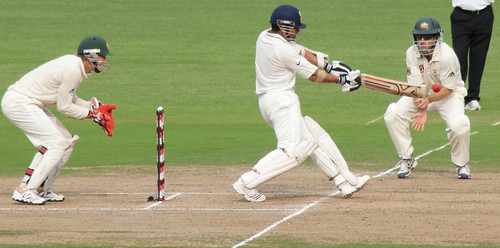 on the quality of private information he has shared. He harbours a dark history of a sport, spanning one quarter of a century. But then why must he endure the inconvenience of revelation? Isn’t he after all a retired executive of a private club, the Board of Control for Cricket in India, affiliated to another private club registered in a tax haven, the International Cricket Council? But then humans, even Tendulkar, have an irresistible compulsion to talk, to share what they know, the very reason why journalism is possible. And it appears that Tendulkar is finally ready. But what exactly might he reveal? Would he give details of a day on a tour of South Africa when he stormed into Mohammad Azharuddin’s hotel room, as a contemporary of Tendulkar told me he did, and confronted him for underperforming? Would he tell us 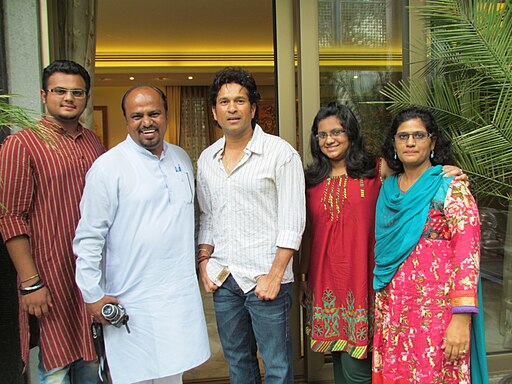 all that he knows about the collusion between players, administrators and bookies? Would he tell us what he thought of Bal Thackeray? Thackeray once publicly rebuked Tendulkar for using auctions to do charity instead of giving away a part of his enormous wealth. Strange that Thackeray must say this. He knew very little about charity or, for that matter, hard-earned money. It is unlikely that Tendulkar would touch upon these subjects. But, he cannot escape talking about Sourav Ganguly, the agonised insecure captain. Would Tendulkar talk about the things Ganguly did to keep his place? Then, there is the problem of Rahul Dravid. There was a distinction between the society’s love for Tendulkar and for Dravid. The distinction was based on 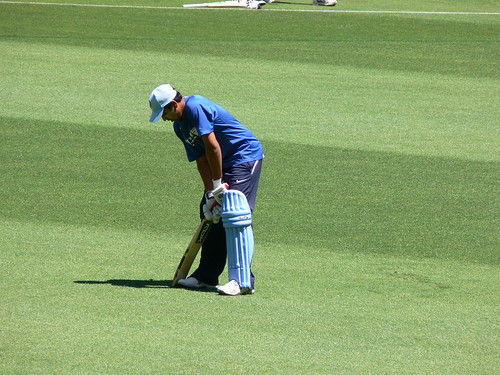 class. Just as Tendulkar’s ruse was humility, Dravid’s was intelligent discourse derived from apparent reading. A segment of the urban society had a Nehruvian adoration for Dravid. Tendulkar knows enough to embarrass Dravid and the ill-fated coach Greg Chappell, and people tell me that he has spoken at length to the book’s collaborators, but it is possible that he has not retained everything. Throughout his career, despite his powers as a preeminent public figure, Tendulkar did not create discreet channels into the media to disseminate news that was favourable to him or that would diminish others. It is not that he did not try but his heart was not in it. Also, he didn’t trust influential journalists enough. Now he has given himself the opportunity to say all that he wants. He has given himself the opportunity to roll in the mud. (Manu Joseph is a journalist and the author of the novel, The Illicit Happiness of Other People) Source: Hindustan Times, Remark: Open images url and paste to find it’s source of sharing, also get connect with each source of sharing articles via specified links. Our Sites unique and other links (if there will be any) are available just for the requirement of the subject not for increasing circulations, as we are not in the promotion of any kind its all for very special issues, personalities etc. |
